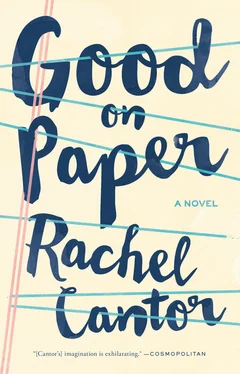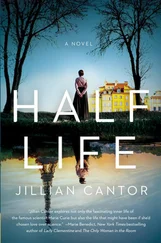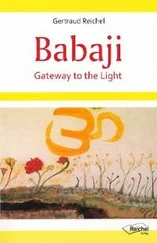You’re such a drama queen! I said, and waited for him to say, Better than a dairy queen , which was his usual response. Instead he said, You’re being selfish, Shira. You’re thinking only about yourself.
You know that’s not true! I said. She’s way too young!
Whatever it is, I heard my baby say, I’m not too young.
We wheeled around in our chairs.
Andi was at the entrance of the living room, wearing her primrose flannel nightie, though it was August. I’m nearly eight, she said. In addition to which my Enrichment Facilitator says I have an old soul.
We’re talking about Ahmad’s secretary. She’s way too young. Too young to water-ski.
Why would she think Ahmad was her father?
We were speaking metaphorically, I said.
I hate figurative language, my baby said. You know that.
I know that, I said, repressing a smile.
Tinky Winky was missing, it turned out. Andi distinctly remembered leaving him in the kitchen when she was building her Tupperware kingdom.
Searching ensued, till Ahmad found that bad boy grinning under Andi’s bed.

The next morning I felt wonderfully well — the kind of well that comes from knowing things are happening , the New Life is upon us. I went to Cuppa Joe’s, where I ordered a decaf-skinny-mocha-capp and two bear claws from Joe himself, a tall, bulky Iranian (né Ali) with whom I’d once been “intimate.” I was still here often, though Joe had married a Persian maid half his age, siring black-haired twins.
I nodded at the regulars — it was too late for the silk-clad boutique lady, and the bespectacled Barnard student, but the latte-drinking actor who once starred in a sitcom about fat men was there, as was the black man with the deformed hand — then I stopped across Broadway to tithe Nate, our local panhandler who, over the years, had transformed himself from “down on his luck” to “Vietnam Vet” to “victim of Agent Orange” to “homeless man with AIDS (not homosexual).”
Can I offer you some change? I asked as I gave him his claw.
No, thanks, he said, I’m fine the way I am.
Our favorite joke.
I brought my breakfast to Straus Park, known in our Den of Propinquity as Slice of Park, because it’s shaped like a piece of pie. Slice of Park commemorates Isidore and Ida Straus, who had a summer home nearby. Isidore immigrated to the U.S. in the 1850s and began his career in Macy’s china department, eventually buying the store with his brother. He and his wife perished with the Titanic , but still, not bad for a new life!
The park had itself recently been revived. We’d watched out our window, bemoaning the Port-a-Potties, the loud equipment, the seemingly endless labor. But it was worth it, because, with minimal West Side fanfare, the park finally reopened. The rotting benches were gone, the statue of Memory was restored, her fountain no longer dry.
I sat often in Slice of Park when the weather was clement, feeling sun-blessed. From my bench I could see Joe’s, People of the Book, the Dollar Store, the Love Drugstore. A few blocks away, beyond my sightline: larger parks, Cohn’s Cones, the China Doll. Just north: Abdul’s Papad Palace, the Eight Bar. Ten blocks south: Symphony Space, the express train. All my cultural, entertainment, transportation, snacking, and discount-shopping needs met within half a mile. I called it my Comfort Zone.
On this morning, I beamed out at the world — at the women checking themselves out in the drugstore window, the nannies pushing strollers, lapdogs bouncing in straw bags against matronly hips, alte kockers gesticulating in the Broadway island. The red-headed boy pushing a scooter as his brother reached desperately for it from his father’s arms. At taxis, buses, kamikaze bike messengers, all honking, screeching, and converging right here , as if Slice of Park were the center of the universe — which to me it was.
New York was more than the places I loved, the people I cared about: it was the web that held us together, that made us all possible. It was the history of this park, of places that were no more — the Pomander Bookshop, the Ideal Restaurant, the Olympia Deli, the summer home of Isidore Straus — it was Memory! It was Iranian pastry chefs and Victims of Agent Orange, it was Old and New World ladies and men. I felt vast love for all who dared to make a life for themselves here.
It was in this exalted mood that I gave notice.
But you have a future in prosthetic legs! Mr. Ferguson said.

Once home, I thought I should dignify my New Life with a ritual — a sacrifice of some kind, a naked dance in the woods. The best I could come up with was to brew some Philosopher’s Tea. The original PT, procured by Ahmad in Azerbaijan, was long gone, but I continued to refill the box with English breakfast. If the philosopher’s stone could transmute base metal into gold, so too could PT transmute my oh-so-base thoughts into words; all that was inchoate would be graced with form. Hallelujah!
I drank it whenever I translated, which meant it had been a while. On the box, a reminder of the professional standard to which I aspired: High-quality tea recalling odor and smack lemon. Store at a dry place away from odorous object .
I brought my tea to the loveseat in the study. I didn’t know when Romei would send his book, but I could prepare for that moment by rereading some of his work.
When I left grad school, I’d wedged my copies of his books under wobbly tables at the Hungarian Pastry Shop, my idea of a joke. I found Ahmad’s copies and arranged them in chronological order against my chest, from Mother Tongue to Nonsense Syllables .
They emitted a mild electric charge: my body was buzzing, my arteries thrumming. I opened Mother Tongue , broke the binding, and began to read.
•
Maybe I fell asleep. There was the matter of the wine I’d drunk the night before and, well, the matter of Romei’s poems. I put the books in my mom-bag and went back to Cuppa Joe’s, where I ordered a mocha double-half-caff and, all virtue, said no to a chocolate bomb.
I read some more, then put the books away and stared out the window. If they had been my copies rather than Ahmad’s, I might have slipped them under Joe’s wobbly table and been done with it.
There was a time when I would have translated Romei for a latte and a package of peanuts. I felt close to him then; I could have gotten closer — I could have gotten very, very close. Translation requires, and generates, a rare kind of intimacy. Like sex done right, I’ve always thought. The translator makes a holy commitment to understand, to listen with all possible intensity, to step backward, ever backward, through the labyrinth of an author’s ideas and devices, uncovering his decisions and triumphs, line by line, until she arrives, finally, at the moment of creation —and before , when words are merely phonemes and breath, and the author lies naked and drunk with his obsessions, visions, and agonizing aphasia. The translator, like one of Noah’s sons, bears witness to this primal scene. It takes a strong stomach. And an attractive host. You had to want to get close.
When I translated Dante’s Vita Nuova , I’d wanted to get close: Like Dante, I was in love, with T.; Vita Nuova seemed written just for me. Dante lived for his true love’s greeting? So did I! His love was a paragon? So was mine! A glimpse of his love made him stupid? Me too! Beatrice was heaven-sent, Dante’s love divinely sanctioned? T. and I were also meant to be. He was my Beatrice, the sum of all virtue, the reason I had been put on this earth.
Читать дальше













